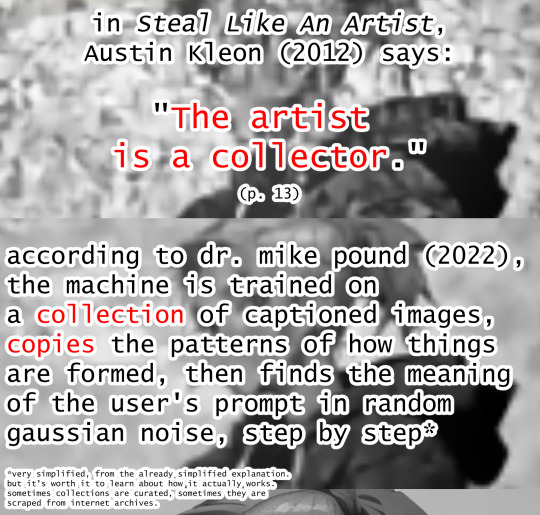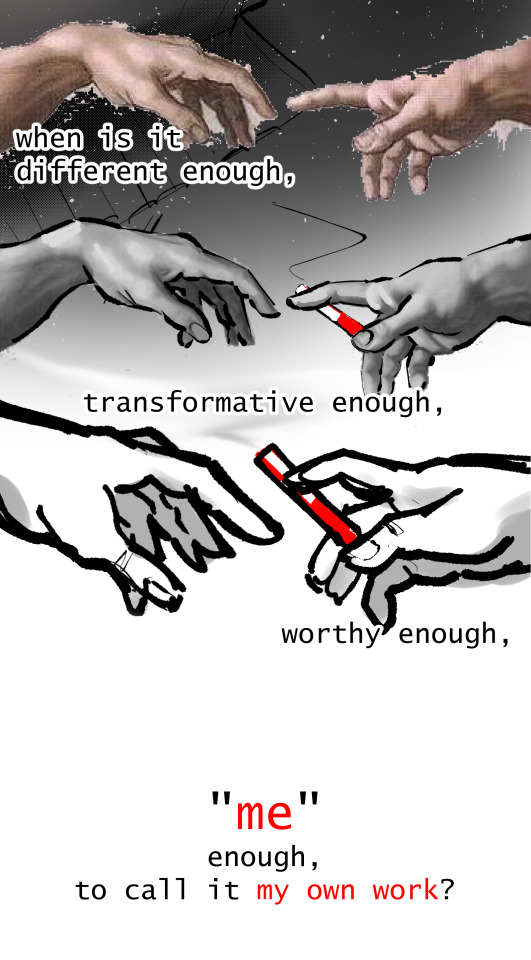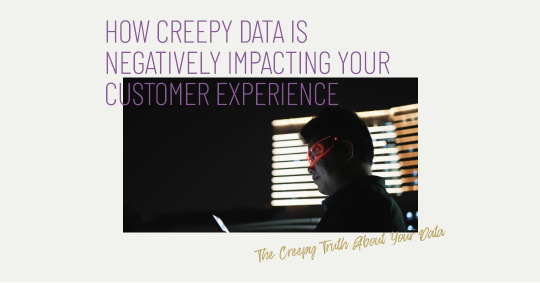#Ethical Data Collection
Explore tagged Tumblr posts
Text
#Ethical Data Collection#B2B Marketers#B2B marketing strategies#b2bindemand#emailmarketing#b2bmarketing#b2b marketing
2 notes
·
View notes
Text
man i hate the current state of ai so much bc it's totally poisoned the well for when actual good and valuable uses of ai are developed ethically and sustainably....
like ai sucks so bad bc of capitalism. they want to sell you on a product that does EVERYTHING. this requires huge amounts of data, so they just scrape the internet and feed everything in without checking if it's accurate or biased or anything. bc it's cheaper and easier.
ai COULD be created with more limited data sets to solve smaller, more specific problems. it would be more useful than trying to shove the entire internet into a LLM and then trying to sell it as a multi tool that can do anything you want kinda poorly.
even in a post-capitalist world there are applications for ai. for example: resource management. data about how many resources specific areas typically use could be collected and fed into a model to predict how many resources should be allocated to a particular area.
this is something that humans would need to be doing and something that we already do, but creating a model based on the data would reduce the amount of time humans need to spend on this important task and reduce the amount of human error.
but bc ai is so shitty now anyone who just announces "hey we created an ai to do this!" will be immediately met with distrust and anger, so any ai model that could potentially be helpful will have an uphill battle bc the ecosystem has just been ruined by all the bullshit chatgpt is selling
#i'm not blaming people for being distrustful btw#they're right to be#they've been shown no evidence that ai can have positive impacts#but it just makes me mad bc ai isn't inherently evil#you can collect data ethically and accurately!#you can use ai to solve complicated problems that would allow humans to spend less time on them!#there are so many possible uses for ai that aren't just plaigerism machine#so don't write of all ai is my point#ai itself isn't the problem
7 notes
·
View notes
Text
I dislike large scale generative AI as much as the next guy but every time someone says it "isn't real art" I get the spiteful urge to use it in some way for a complex postmodern art piece where the point is "everything is art, actually, and your arguments are flawed". and I'd hope that it would live in people's heads rent free the same way that damn urinal has lived in art purists' heads for years now.
but I can't do that with generative AI that exists currently because I do in fact hate the plagiarism machine.
#i don't actually think there would be anything wrong with a generative AI trained on a specific set of data#chosen and created specifically for a project#I'm yet to find someone who can give me a reason other than 'it's not real art' why this would be unacceptable#i had an idea for a horror game where the environments were generated & twisted based on pictures I'd taken in a hospital#& just made fucked up in a way im not able to do#but with intention and like... ethically collected data lol#& not infinite resources forever#idk#the system speaks#ai
4 notes
·
View notes
Text
I hit 500 followers on tiktok so I want to do something for that but there's also somethign else I'm working on and also watching Eve of the Daleks made me want to edit 13 again and also I have no time bc I told my mum I'd help her do something
#and tomorrow i need to do some actual work on my dissertation#which i am incredibly behind on#i dont know how people say they just winged their whole diss in a day#how can you do that and also read all the research and do all the other stuff#i have to write an ethics application and organise with the child lab and my potential collaborators#and do a risk assesment#and then actually collect the data#and write the dissertation#i mean i dont need to do that all tomorrow but i just feel like things are gonna be pretty tight
2 notes
·
View notes
Text
“Wait, if we don’t need raw data, we can just take one reading and claim it’s the average reading, right?”
#my BRO once said#honestly she’s not wrong#but there’s ethical issues here#BUT we have 1 week to collect data and complete the research paper#so do I really care?#no#my teacher would never know
2 notes
·
View notes
Text
Using Web Scraping for Market Research (Legally)
Web scraping is like sending a digital intern out to scan the internet for useful data — but faster, cheaper, and tirelessly efficient. For businesses, it’s a goldmine for market research, from tracking competitors to understanding customer sentiment. But here’s the catch: it has to be done legally and ethically. Let’s walk through how to use web scraping for market research — without crossing…
0 notes
Text
Israel’s Trojan Horse: How Ghana’s Pegasus Purchase Ignites Privacy Concerns Across Africa
New Post has been published on https://thedigitalinsider.com/israels-trojan-horse-how-ghanas-pegasus-purchase-ignites-privacy-concerns-across-africa/
Israel’s Trojan Horse: How Ghana’s Pegasus Purchase Ignites Privacy Concerns Across Africa


In the shadowy world of international espionage and digital surveillance, few names evoke as much controversy as Israel’s NSO Group and its infamous Pegasus spyware. As Ghana joins the ranks of African nations that have acquired this powerful tool, questions arise about the implications for privacy, democracy, and Israel’s role in shaping the continent’s digital landscape.
The Ghanaian Gambit
In December 2015, under the cover of bureaucratic obscurity, Ghana made a fateful decision. The West African nation, known for its relative stability and democratic progress, quietly signed a $5.5 million contract to acquire the Pegasus spyware system. This deal, shrouded in secrecy, involved a complex web of players: the Israeli NSO Group, a shadowy intermediary called Infralocks Development Limited (IDL), and Ghana’s National Communications Authority (NCA).The transaction raised eyebrows not just for its clandestine nature, but for the markup involved. IDL was set to resell the system to the NCA for $8 million, pocketing a cool $2.5 million in the process. This financial sleight of hand would later come back to haunt the deal’s architects, leading to legal repercussions and convictions.
Pegasus: The All-Seeing Eye
But what exactly did Ghana acquire? Pegasus is no ordinary surveillance tool. It’s a digital skeleton key, capable of unlocking the most intimate secrets of any smartphone it infects. With a single missed call or a seemingly innocuous text message, Pegasus can silently infiltrate a device, granting its operators unfettered access to calls, messages, photos, and even the phone’s microphone and camera.What makes Pegasus truly terrifying is its “zero-click” capability. Unlike traditional malware that requires user interaction, Pegasus can infect a device without any action from its target. This invisible intrusion leaves no trace, turning personal devices into unwitting spies against their owners.The technical prowess of Pegasus is staggering. Once installed, it can:
Read text messages and emails
Monitor and record phone calls
Track GPS location in real-time
Access the device’s microphone and camera
Harvest data from various apps, including encrypted messaging platforms
Collect passwords and sensitive information
The Dark Side of Innovation
The story of Pegasus and its creator, NSO Group, is a cautionary tale of technology’s double-edged sword. Founded in 2010 by former members of Unit 8200, Israel’s elite intelligence corps, NSO Group initially positioned itself as a force for good, developing tools to help governments combat terrorism and crime.However, as reports of Pegasus being used to target journalists, human rights activists, and political dissidents began to surface, the company’s narrative began to unravel. From Mexico to Saudi Arabia, from India to Morocco, Pegasus has been implicated in some of the most egregious violations of privacy and human rights in recent years.The Pegasus Project, a collaborative investigation by 17 media organizations, revealed the shocking scale of the spyware’s misuse. Thousands of phone numbers belonging to activists, journalists, and even heads of state appeared on a list of potential surveillance targets. This revelation sent shockwaves through the international community, leading to diplomatic tensions and calls for greater regulation of the cyber-surveillance industry.
Ghana’s Surveillance State
For Ghana, the acquisition of Pegasus marked a significant escalation in its surveillance capabilities. While the government justified the purchase as necessary for national security, critics saw a more sinister motive. In a country with a history of political tensions, the potential for abuse was clear.The fears of misuse were not unfounded. In May 2020, Ghana’s High Court ruled the Pegasus purchase illegal, convicting two NCA officials and the former National Security Coordinator. The spyware, it emerged, had been installed not at a secure government facility, but at the private residence of the national security advisor, raising alarming questions about its intended use.This revelation sparked intense debate about the balance between national security and individual privacy rights. Human rights organizations expressed concerns about the potential for these technologies to be used for political repression and violation of privacy rights, particularly in a region where democratic institutions are still developing.
Israel’s African Gambit
Ghana’s Pegasus saga is part of a larger story of Israel’s growing influence in Africa. Through the export of advanced surveillance technologies, Israel has been cultivating relationships with African nations, positioning itself as a key player in the continent’s security landscape.This digital diplomacy serves multiple purposes for Israel. It opens new markets for its tech industry, strengthens diplomatic ties, and potentially provides valuable intelligence. However, it also raises ethical questions about the responsibility of nations in exporting powerful surveillance tools to countries with questionable human rights records.The sale of surveillance technology to African countries is not limited to Israel. China, through companies like Huawei and ZTE, has also been actively involved in deploying similar technologies across the continent, raising concerns about technological dependence and data sovereignty.
Legal Challenges and International Backlash
The proliferation of Pegasus and similar spyware has not gone unchallenged. In 2021, Apple filed a lawsuit against NSO Group in the United States, accusing the company of targeting Apple users with its spyware. Similarly, WhatsApp sued NSO Group for allegedly exploiting its messaging platform to deploy Pegasus spyware on users’ devices.The international community has also taken action. The U.S. Department of Commerce added NSO Group to its Entity List, effectively restricting its access to American technology and markets. This decision was based on evidence that NSO’s activities were contrary to U.S. national security and foreign policy interests.In Europe, the European Parliament established the PEGA Committee to investigate the use of Pegasus and similar spyware across the continent. The committee has called for a moratorium on the sale and use of spyware until rigorous safeguards are in place.
The Road Ahead
As Ghana grapples with the fallout from its Pegasus purchase, the broader implications for Africa and the world are clear. The proliferation of advanced surveillance technologies poses a significant threat to privacy, freedom of expression, and democratic norms.The Pegasus affair serves as a wake-up call, highlighting the urgent need for international regulations governing the sale and use of surveillance technologies. It also underscores the delicate balance between national security and individual rights in the digital age.For Ghana, Israel, and the world, the Pegasus saga is a stark reminder of the power of technology to shape our lives and our societies. As we navigate this brave new world of digital surveillance, the choices we make today will determine the kind of future we inhabit tomorrow.In the end, the story of Pegasus in Ghana is more than just a tale of spyware and surveillance. It’s a mirror reflecting our collective struggles with power, privacy, and the price of security in the 21st century. As technology continues to advance, it is imperative that we remain vigilant, fostering a global dialogue on the ethical use of surveillance tools and the protection of fundamental human rights in the digital age.
#acquisition#Africa#American#apple#apps#China#collaborative#Collective#Commerce#communications#Community#Companies#court#crime#cyber#Dark#data#deal#december#Democracy#democratic#deploying#development#devices#Dialogue#double#espionage#ethical#Europe#european parliament
0 notes
Text
#Tags:Biometric Data#Blockchain and Privacy#Data Collection#Data Ownership#Data Security#Digital Twins#Ethical AI#facts#Healthcare Technology#Identity Theft#life#Podcast#Privacy Concerns#Privacy Regulations#Real-Time Analytics#serious#Smart Cities#straight forward#Surveillance#truth#upfront#website
0 notes
Text
Mobile Phones and Children: The Hidden Dangers of Digital Addiction and Data Manipulation
Explore how smartphone use and exposure to emotionally charged content can impact children's mental health, leading to anxiety and depression. Learn about the role of AI algorithms and get tips for fostering healthier digital habits for our kids.
In today’s digital world, mobile phones are more than just tools—they have become an integral part of everyday life, especially for children and adolescents. While these devices offer numerous benefits, such as entertainment, education and social connectivity, there is a darker side to their pervasive presence. Beyond visible impacts like mobile phone addiction, there is an unseen influence from…
#AI algorithms#AI-driven engagement#Behavioral manipulation#Children and smartphones#Data collection#Digital age#Digital echo chamber#Digital habits#Digital literacy#Dopamine loop#Emotional manipulation#Ethical implications of AI#Impact on family dynamics#Mental health in adolescents#Mobile phone addiction#Online safety#Parental smartphone addiction#Personalized content#Privacy concerns#Psychological impact#Screen time management#Social media influence#Strategies for healthy digital use#Technology and youth
1 note
·
View note
Text
I think a lot of important nuance on the topic is missing here, but I want to share this becuase this comic/post does make some good points and provides a nuance that is missing from the larger discussion on AI. I'll make a post about this here.












"Original" Sin is what i've titled this piece. by me. sorry if you don't have "collapse long posts" enabled. I have many thoughts.
Transcript - References
#ai#jacob geller is the goat#machine learning#plaigarism#copyright#Art#artists#artificial intelligence#artwork#digital art#ownership#ethical principles#data collection services#data harvesting#data#inspiration#copyright is BS
8K notes
·
View notes
Text
Shifts in Global Alliances: The Fracturing of Russia’s CSTO and the Implications for NATO Relations
May 9, 2024 Summary: Recent reports suggest that there is growing tension between Russia and some of its allies within the Collective Security Treaty Organization (CSTO), which has been likened to a smaller version of NATO. The Armenian Prime Minister, Nikol Pashinyan, has expressed frustration with Russia and President Vladimir Putin, indicating a potential withdrawal of Armenia from the CSTO.…

View On WordPress
#administrative automation#AI News#Azerbaijan#Collective Security Treaty Organization#crisis management#csto#cybersecurity#data analysis#enhanced negaotiation#ethical AI#News#Nikol Pashinyanm#prediction#public diplomacy#putin#scenario simulation
0 notes
Text
Creepy Data vs. First Person Data: Why Data Quality Matters
Data is the lifeblood of information-driven businesses and organizations. It fuels everything from targeted marketing campaigns to artificial intelligence algorithms, driving decision-making processes and shaping the way we interact with the digital world. However, not all data is created equal. There’s a fundamental distinction between two types of data that can have a profound impact on…

View On WordPress
0 notes
Text
re: "outlawing AI"
the thing i think a lot of people have trouble understanding is that "ai" as we know it isn't a circuitboard or a computer part or an invention - it's a discovery, like calculus or chemistry. the genie *can't* be re-corked because it'd be like trying to "cork" the concept of, say, trigonometry. you can't "un-invent" it.
even if you managed to somehow completely outlaw the performance of the kinds of linear algebra required for ML, and outlawed the data collection necessary, and sure, managed to get style copyrighted, you can't un-discover the underlying mathematical facts. people will just do it in mexico instead. it'd be like trying to outlaw guns by trying to get people to forget that you can ignite a mixture of powders in a small metal barrel to propel things very fast. or trying to outlaw fire by threatening to take away everyone's sticks.
the battleground is already here. technofascists and bad actors without your ethical constraints are drawing the lines and flooding the zone with propaganda & slop, and you’re wasting time insisting to your enemies that it’s unfair you’re being asked to fight with guns when you’d rather use sticks.
984 notes
·
View notes
Text
#Adversarial testing#AI#Artificial Intelligence#Auditing#Bias detection#Bias mitigation#Black box algorithms#Collaboration#Contextual biases#Data bias#Data collection#Discriminatory outcomes#Diverse and representative data#Diversity in development teams#Education#Equity#Ethical guidelines#Explainability#Fair AI systems#Fairness-aware learning#Feedback loops#Gender bias#Inclusivity#Justice#Legal implications#Machine Learning#Monitoring#Privacy and security#Public awareness#Racial bias
0 notes
Text
The "tiktok ban" should scare you and here's why.
Rant made by an autistic, history-loving, chronically online American tiktok cosplayer. Please let me know if I've gotten anything wrong and I will edit the post.
Reblog to spread awareness!
This is not just about Tiktok, and it's not about national security. The Tiktok ban is wrapped up in the "Protecting Americans from Foreign Adversary Controlled Applications Act" which has the ability to ban any foreign website or app that the United States government sees as a threat to their "democracy." Not only that, but if the gov't didn't want China to gather data, then they would ban things like Shein and Temu (the latter which they advertised during the Super Bowl), which collect similar data that Tiktok does. If they wanted to prevent our data being stolen in general, they would ban companies like Meta, which monetarily supports the Tiktok ban and had to change their name because "Facebook" was associated with the largest data leak in history.
The documentations of the Tiktok court interrogations prove how incompetent our government is. Repeatedly asking the TikTok CEO Mr. Chew if he's Chinese while he repeatedly assures them he's Singaporean. The officials being concerned that they can't find Singapore on a map. The officials then being confused why the app would be able to have access to their wifi because it needs wifi to load.
The possibility of the US buying Tiktok exposes a greater issue in America: monopolies. The Sherman Antitrust Act was passed in 1890 that restricted the activities of large companies known as monopolies, which started out as small companies and would either buy other companies or buy the factories which produced all their materials. This eliminated competition in the market and gave the monopolies almost full control of quality and prices of items, and it was considered very anti-American at the time. Since the US already has multiple major social medias, including Facebook (Meta), Instagram (Meta), Threads (Meta), X (formerly Twitter), Snapchat, and Reddit, adding Tiktok would mean that nobody could compete with the US in the social media market. This makes them a monopoly, and it's incredibly dangerous.
Banning Tiktok breaks several American trademarks. A) the Republicans banning Tiktok are very concerned about their second amendment right to own guns, but they seem to not care about the first amendment right to freedom of speech and press, which Tiktok delivers. Of course there are app guidelines, but for the most part you have fairly uncensored political and ethical commentary like no other social media. B) the only other countries that have banned Tiktok are either heavily demonized by America or are direct targets for American propaganda (ex. China), which really doesn't make the ban look good. C) banning a social media for the purpose of censorship is a trademark of communism, which Americans are INCREDIBLY wary of.
Your country may follow in suit. Because of America's influence as a global superpower and an ally to many other major powers, America banning Tiktok would likely lead to a domino effect in other countries.
The rich get richer. There is a concept called social darwinism, in which it is the rich's beliefs that the poor must fend for themselves without the help of the government in order to make a living - "survival of the fittest." Tiktok contributed around $14.7 billion USD in 2023 and $24.2 billion in 2024, and it supports around 224,000 jobs [source]. The actual Tiktok website says in 2023, they contributed $15 billion USD in revenue and supported 7 million US businesses [source]. Without these jobs, there could be in increase in homelessness, debt, and sickness due to withdrawals (if you're incredibly addicted to Tiktok) and lack of quick dopamine hits (due to the rapidfire nature of the algorithm).
Remember that the president is not your friend !! Many of the political figures rallying to support Tiktok right now, such as President Biden, initially voted for the ban. President Biden is likely supporting now so that Trump won't get credit for it, and future President Trump is likely doing it for brownie points among younger generations.
The Xiaohongshu migration exposed the American government and its lies. The stories from American 'Tiktok refugees' about the questions from native Chinese on the Xiaohongshu / Rednote / Redbook app (considered the Chinese mixed of Pinterest, Instagram, and Facebook) posed a lot of conspiracies and realizations about the American government. The Chinese actually own their homes, they have lower food prices than we do, and they have a slim homelessness rate. Whether this is true or not, it has greatly influenced how we see ourselves in the grand scheme of the American oligarchy, and that is not something that can be suppressed with an app being banned.
Tiktok is not totally Chinese! The CEO is Singaporean, as I've already stated, and there are multiple headquarters in the US, with the main one being in Los Angeles.
In conclusion...
Whether Tiktok is banned or not, whether permanently or not, no matter who saves it or rallies against it, remember that it is harder to scare and control someone when they are in a group. And if you think this was interesting, I'd love it if you could reblog to show some support and inform your friends as well. <3
THIS IS NOT RIGHT VS LEFT❗️IT'S UP VS DOWN❗️
#tiktok#tiktok ban#political#finch and the bard analysis#rednote#xiaohongshu#little red book#tiktok refugee#china#america#usa politics
1K notes
·
View notes